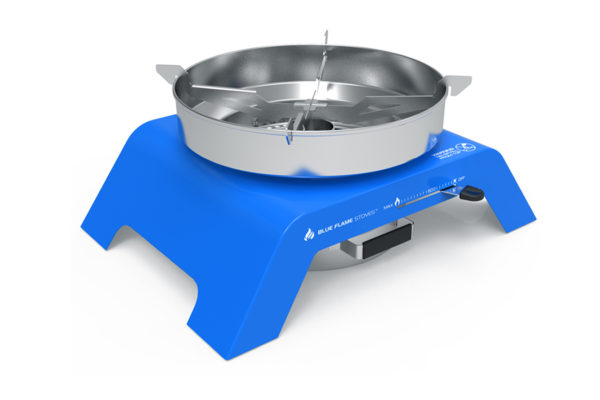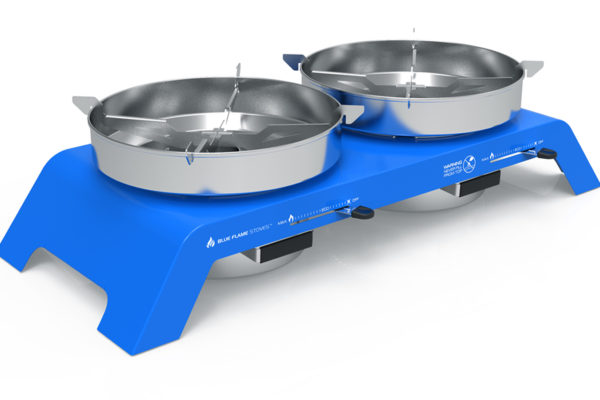More than 55 000 of our ethanol stoves have been distributed under the SAFI brand, and the quality of the stoves has been proven in daily use, in tough conditions since 2014.
Our ethanol cookstoves are safe, clean burning and durable. The unique burning technology produces negligible soot or particles. The stoves are tested by SeTAR in South Africa and by KEBS in Kenya, with very satisfactory results showing a combination of high performance and low emissions.
The stoves have removable fuel canisters which slide out for easy refilling when empty. The canisters are filled with mineral wool for safe fuel retention. All our stoves come with a windshield which makes them effective where other stoves really struggle.
Real life performance
Cooking conditions in Africa are often windy, even indoors. While ventilation is generally desirable when cooking, the same ventilation will affect the performance of most ethanol cookstoves dramatically. Tests show that many stoves actually struggle to heat water to boiling temperature, when exposed to even gentle wind or draft as the wind blows the flame away from the pot. All our stoves are equipped with a windshield surrounding the burner and the pot to ensure optimal performance in exposed conditions.
Quality and lifespan
The materials used in our stoves are specified to secure a long lifetime and a stable performance. All parts exposed to ethanol or the flame itself are made from SS304 grade stainless steel, which is the recommended grade for ethanol handling.
The fuel canister is also made from SS304 stainless steel. Low quality or contaminated fuel can affect the performance of all mineral wool canisters over time. Our canister is therefore designed to allow replacement of the mineral wool and wick material inside extending the canister lifetime considerably.
Study results
Taken from two reports by Climate Solutions Consulting, reviewing the SAFI ethanol stoves in Kibera and Kisumu, Kenya.
From: Black carbon emission factor measurement for ethanol, charcoal and kerosene stoves in Kibera, Kenya
"The study aims at characterising cookstoves’ real life emissions of black carbon. Cookstoves used in the developing world are responsible for about 25% of the world’s black carbon emissions.
As far as the climate impact from the emission of black and organic carbon is concerned the ethanol stove performs 12 times better than kerosene and 6 times better charcoal stoves. Said differently, that means that switching from a kerosene stove or a charcoal stove to an ethanol stove reduces the climate forcing impact by 91% from a kerosene stove and 83% from a charcoal stove.
Taking into account the average yearly fuel consumption of the households targeted by the SAFI ethanol cooker in Kenya, this reduction translates into about one tonne of CO per year per household avoided. This reduction comes in addition to the 10 tonnes of CO2 equivalent from the reduction of CO2 calculated with the CDM AMS IE methodology.
PM2.5 emissions are reduced by 65% compared to kerosene and 97% compared to charcoal while Black Carbon emissions are reduced by 84% compared to kerosene and 95% compared to charcoal."
From: Quantification of the health impact of the SAFI ethanol cooker in Kenya.
"We can conclude that the adoption of the SAFI ethanol cooker has a significant impact on exposure to PM2.5 in the households who purchased it. Because the initial situation is a lot worse in suburban areas (where the use of firewood and charcoal is more common) this is where the SAFI cooker can achieve the highest impact.
The data collected shows that the use of the SAFI ethanol stoves significantly reduce Indoor Air Pollution (PM2.5) by 28% in Kibera and by 68% in Kisumu.
This in turn translates to 36 DALYs avoided in Kisumu and 15 DALYs avoided in Kibera for 1,000 stoves used during one year. This result is very encouraging and shows that promoting a clean stove is a valid public health intervention."
DALY definition: Disability-adjusted life years. One DALY can be thought of as one lost year of "healthy" life (World Health Organisation).

